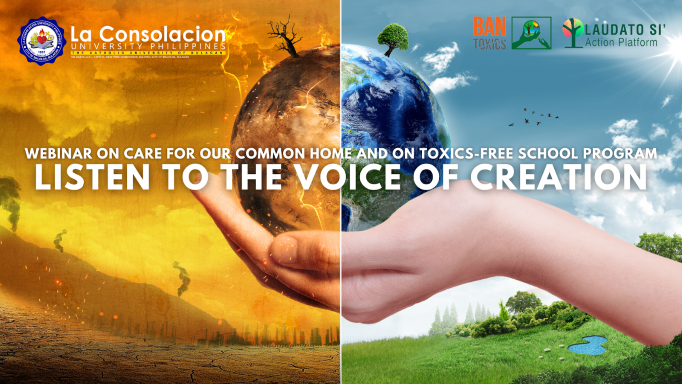September 23 – BAN Toxics and La Consolacion University Philippines staged a webinar on environmental protection, best practices to promote toxics and wastes-free schools, and the protection of public health from the adverse effects of chemicals and wastes found in schools and communities through the Toxics-Free Schools Program.
The three-hour webinar titled “Care for Our Common Home and on Toxics-Free Schools Program” was based on the Message of the Holy Father Francis on the occasion of the World Day of Prayer for the Care of Creation “Listen to the Voice of Creation.”
The event was also made possible through the help and support of the Environmental Studies Institute – Miriam College and Laudato Si’ Action Platform.
The discussion was joined by Leah Czarina Guevarra of Miriam College, Thony Dizon of BAN Toxics, and Melinda Lamorena of Environmental Studies Institute of Miriam College.
Guevarra’s topic revolved around the mandate to protect the environment in relation to the theme “Listen to the voice of creation.”
“Laudato Si’ also urges us to work together because it affects us. We are part of the problem whether we like it or not, but we are also part of the solution. We need to work together to create a better world for future generations and asks us to make the necessary changes in our lives,” said Leah Guevarra, MISMO Program Coordinator of Miriam College.
Lamorena’s talk highlighted Miriam College’s best practices towards becoming a toxics-free school.
“The specific objective of our Zero-Waste Campaign is to integrate zero-waste management concepts in the curricular and co-curricular programs of each unit as a way of responding to climate change. For our students to be able to assess the situation and to decide on how to act, they have to know what’s happening,” said Melinda Lamorena, Officer-in-Charge at Environmental Studies Institute of Miriam College.
Dizon discussed BAN Toxics’ Toxics-Free Schools Program (TFSP) to protect students and faculty members from the adverse effects of toxic chemicals and wastes that may be present in schools and communities.
In 2014, the Toxics-Free Schools Program (TFSP) campaign was established by BAN Toxics to increase awareness about the issue of toxic pollution in schools, homes and communities. The program seeks to promote safe and environment-friendly alternatives as well as engage the school and the community on proper, sound chemicals and wastes management.
Human exposure to lead may come from the use of fossil fuels, leaded gasoline, industrial facilities, and the use of lead-based paint in homes and schools. Primary sources of human exposure to mercury are mercury-added products such as dental amalgams, mercurial thermometers, and gold mining activities. Phthalates are usually found in personal care products such as soap and shampoo, as well as plastic-based school supplies. People are exposed to cadmium through cigarettes, batteries, and cadmium-added paint. Primary exposure to arsenic is from pesticides and drinking contaminated water and food.
“Academic institutions should look for ways to incorporate the Toxics-Free Schools Program into their curriculum and everyday practice. This is to protect both students and faculty from the negative effects of chemicals and wastes that may be found in schools and at home,” says Thony Dizon, Toxics Campaigner of BAN Toxics.
###
Media Contact
Melendre Heidyl dela Torre, Communications Officer, BAN Toxics
melendre@bantoxics.org | +63 917 514 2956
BAN Toxics, Inc.












